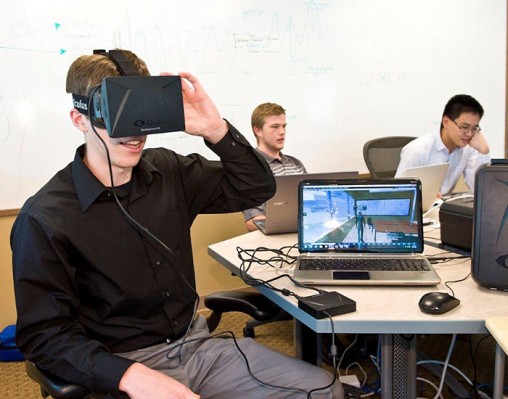
From left: Students Brandon Ranck, Ben Straiton and Josh Lan at the Discovery Lab. The lab’s Summer-at-the-Edge program will hold an open house on Aug. 14 in the Student Union.
It feels like the fictional Q Branch lab in the James Bond movies that produced exotic equipment such as the dagger shoe, ejector seat and rocket belt. Only it is the Air Force Research Laboratory’s (AFRL) Discovery Lab Summer-at-the-Edge program — a very real incubator of student brainpower pulsing with ideas that are becoming the foundation of future technologies.
And from 1 to 5:30 p.m. on Thursday, Aug. 14, there will be an open house in the Apollo Room of the Wright State University Student Union to demonstrate some of those technologies. They include a humanoid robot, a 3-D printed air vehicle, a surgical simulator, a virtual aerospace center and more — nearly 20 technologies in all.
“This is real stuff, said David Brendel, a senior group lead at the lab. “The Discovery Lab is the intersection between government/industry research interests and undergraduate students applying their skills to those projects. We develop the foundation for the product, and then someone else can take it to the next technology-readiness level. We prove that it can be done.”
The AFRL Discovery Lab is a partnership between the Wright Brothers Institute and the Air Force Research Laboratory. Rob Williams of AFRL is the research director. Summer-at-the-Edge brings together students from high school to college to work in the lab’s high-tech environment at the Tec^Edge center in an intense collaboration on a specific challenge or opportunity.
In its eighth year, the Summer-at-the-Edge program offers highly sought-after summer internships that give undergraduate engineering students the freedom to solve problems or meet challenges facing the military, said Lydia Divine, a senior group lead. The interns work with technologies, software and programs they otherwise would not be able to experience.
“We offer probably the most comprehensive STEM-related internship you can find, at least in the area. You won’t find anything like this,” said Brendel. “This has been described by senior Air Force leadership as boot camp for engineers. It’s an intense program.”
The open house is expected to attract industry representatives, government officials and high school students.
“The students can get their hands on our computer programs and work with the robots and other technologies we’ve created,” Brendel said. “Hopefully, they will gain more interest in STEM based on their experience with that.”
Virtual reality is playing a growing role in Summer-at-the-Edge and the AFRL Discovery Lab. The lab has created a 3-D virtual research campus called Deep Horizons that houses virtual research institutions that will enable student researchers from around the nation to take the form of avatars and share their academic research projects in a 3-D virtual setting.
A three-day virtual technology conference, VTecCon 2014, at the end of September is expected to attract 1,000 participants from government, industry and academia. Students who attend the 3-D virtual conference will learn about internship opportunities during the school year through Deep Horizons virtual research campus that can lead to research internship opportunities at the AFRL Discovery Lab next summer.

 Wright State receives $3 million grant to strengthen civic literacy and engagement across Southwest Ohio
Wright State receives $3 million grant to strengthen civic literacy and engagement across Southwest Ohio  Fitness Center renovation brings new equipment and excitement to Wright State’s Campus Recreation
Fitness Center renovation brings new equipment and excitement to Wright State’s Campus Recreation  Wright State University settles civil lawsuit against WSARC, now doing business as Parallax Advanced Research Corporation
Wright State University settles civil lawsuit against WSARC, now doing business as Parallax Advanced Research Corporation  Wright State senior paints a new path through fine arts internship
Wright State senior paints a new path through fine arts internship  Wright State recognizes Nursing Professor Kim Ringo for advancing international student success
Wright State recognizes Nursing Professor Kim Ringo for advancing international student success 